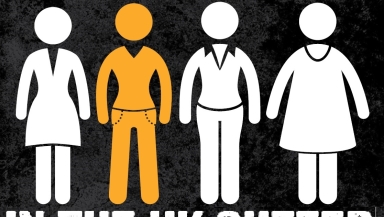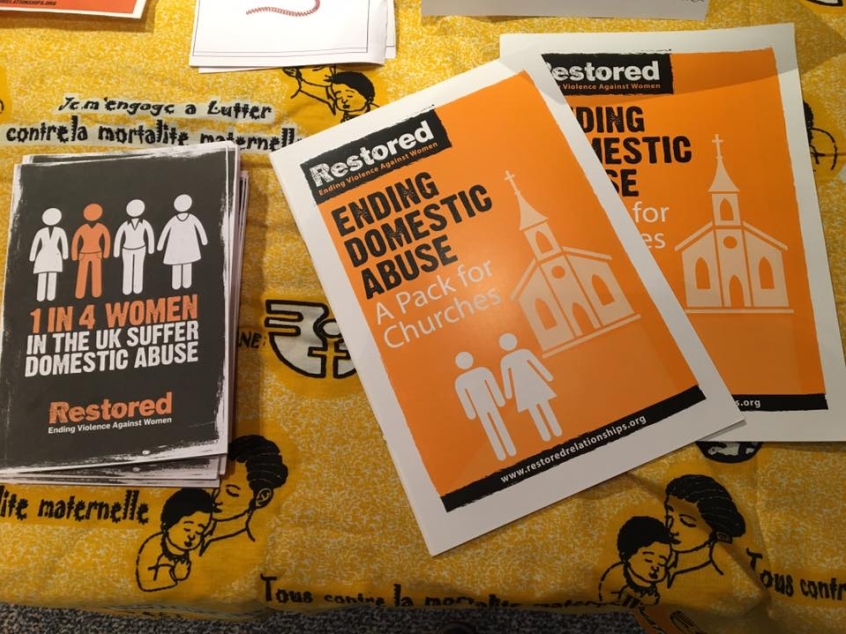
Marriage is a big part of the Christian faith but sadly, that doesn't mean domestic abuse never happens in the Church. Quite the opposite. And when it does happen, those Christian women who are affected face the difficult decision of leaving their abuser or staying with them.
Often it's an agonising decision, says Bekah Legg, director of Restored, a Christian charity working with domestic abuse survivors in the Church.
That's because they think that the Christian faith does not permit them to leave an abusive husband. If they do leave and find safety in a shelter, the staff there are often ill-equipped to speak into their faith concerns and simply tell them to leave the Church, she explains.
The charity recently published a handbook for shelters looking after some of the Christian women who have made the difficult decision to leave their husbands.
She talks to Christian Today about why the book was needed and the extra layer of support that Christian domestic abuse victims need because of their faith.
CT: What is going through the mind of a woman when they are in an abusive relationship and are facing that question of whether they should leave or stay?
Bekah: Esther Sweetman, who manages our Survivors' Network, describes the mental situation for women in that situation as "chaos" because there are so many thoughts and emotions going on that it can be hard to focus in on any one thing.
They have a number of questions in their mind, like: what else can I do? How can I try harder? What can I do to stop this? Will anybody believe me? Does anybody care? What have I done to deserve this?
Oftentimes, survivors assume a responsibility for what's happened that isn't actually theirs, and they have lost so much of their identity and their self worth by this point that many of their questions are turned back in on themselves.
Sometimes they also wonder: how would I ever cope if I wasn't here with him? Because they've lost the ability to believe that they could actually cope on their own; they're actually quite scared by that prospect.
CT: Is it easy for women in the Church to get help from the Church? Have we succeeded in creating a safe space for women to come forward?
Bekah: It really depends on the church that you are in. We did some research in 2018 into domestic abuse in the Church and we found that only one in four women who did seek help did so from their church leader. Three in four women sought it outside because they were nervous about the response and only two in seven churchgoers considered their church equipped to respond to domestic abuse.
These are sad statistics because we all want to see the Church be all that it can be. It should be a place of safety, a place of refuge, and a place to find love and support but sometimes, even with the best will in the world, it gets that wrong.
CT: The emphasis in the Christian faith is on marriage and against divorce. So is their faith an extra source of agony for Christian women considering leaving an abusive spouse? Do they go through a cycle of 'but the Bible says'?

Bekah: Yes, it is definitely an extra agony and it's often put upon them by well-meaning people within the Church. It's easy to get a little muddled because of course marriage is important to God. But it's not more important than the individual; the institution is not more important than the person. Domestic abuse is complex, it's not straightforward.
We have 250 women in our Survivors' Network and we hear this again and again: 'but what about God...' 'But God hates divorce....' 'But surely marriage is for life so how can I leave...'
A lot of women feel like they have to choose between their faith and their freedom, but we want to help them realise that they can have both. We work hard to help people see the Bible passages in context, to understand how God really feels about them as individuals, and how God feels about abuse, because He's horrified by it.
CT: You've created this handbook to help Christian women in the shelters. What do you think is missing at the moment in the help available to them?
Bekah: One thing is the spiritual input. Whichever faith background the women are from, when they get to a refuge they are very unlikely to find somebody who understands this part of their life. While there are always exceptions, generally speaking they will find people who are incredibly equipped to support them in practical ways, but they are unlikely to find someone who can help them sort through the big faith questions or empathise with that extra layer of conflict that their faith brings.
Something we have heard again and again from the women in our Survivors' Network is: 'They just told me to stop going to church.' But if your faith is important to you and part of who you are, that doesn't help at all! It just adds to that feeling in them that they have to choose between their faith and freedom.

CT: What approach does the handbook take in terms of helping the women heal?
Bekah: There are three sections and the first section is very practical. It talks women through the practicalities of finding somewhere to live, what protective orders are available, their parenting options, and things like how to deal with debt, because often survivors are saddled with debt they never actually accrued themselves.
Then it goes on to tackle healing and recovery, so things like self-care and how to have healthy boundaries going forward, and how to re-enter relationships - any kind of relationship, never mind a romantic one. Sometimes survivors need a framework of words to express what they've been through so this handbook gives them that.
A final section looks at some of the theological issues that Christian survivors in particular struggle with and what the Bible has to say about domestic abuse. Sometimes there are extra levels of spiritual abuse going on, or sometimes survivors have been told by other believers that Jesus suffered and so there is a holiness to their suffering. Some verses have been taken out of context and applied in the wrong way so it's important to unpack what the Bible says about forgiveness, divorce and marriage.
CT: It seems like a valuable book for anyone in the church to read if they want to know how to support someone in an abusive relationship.
Bekah: It's an excellent resource for people in the Church as well as those who work with domestic abuse victims but have no understanding of faith themselves. As an organisation, we are really committed to equipping churches to respond well if they are concerned about domestic abuse or somebody discloses it to them.
It's been taboo for way too long in the Church so the more we talk about it, the easier it will be for people to speak up if it's happening to them. We need to be having that bigger conversation of: how do we stop this from happening in the first place? And what do we need to change in our culture in order to start treating women differently and treat each other as equals?
CT: Has the pandemic had an impact on domestic abuse?
Bekah: Sadly yes. The National Domestic Abuse Helpline run by Refuge saw a 700% increase in calls in a single day after the UK went into the first national lockdown, which is staggering statistics. We don't offer a helpline but we have seen more than a doubling of visitors to our website since the pandemic started. We've also delivered a lot of training to churches over the year as well, which on the one hand is sad because it shows the extent of the problem, but on the other hand is good because it means people aren't turning the other way anymore but are trying to come to grips with it.
CT: Do you know what the pandemic has been like for women still in abusive relationships? Has it been a nightmare scenario for them?
Bekah: It's just compounded everything. Domestic abuse is a behind-closed-doors issue at the best of times but once the whole country was put behind closed doors and not allowed out, it was almost like a licence to abuse. Victoria Derbyshire spoke to one woman who told her that when lockdown was being announced, her husband turned to her and said, "Let the games begin." It's chilling.
It's also meant fewer opportunities for women to have respite because if they or the abuser go to work, that gives the woman a day off, it's a break from the abuse, and they have the opportunity to meet other people who bring joy into their life or perhaps know what's going on and are someone they can talk to.
In some situations, the pandemic has given men another weapon in their arsenal of abuse because all of the rules and restrictions are just another form of control that they can manipulate: 'no you're not allowed to go out.' 'You're not allowed to do this, the government said so.' The pandemic has just added an extra layer of control.

CT: Have the lockdowns made it difficult for women to leave abusive relationships and go into a shelter? Did that stop during lockdown?
Bekah: Actually the Government responded fairly quickly and were very good in making domestic abuse the exception to the rules so that victims could leave to find safety. But in addition to that, they have also allowed perpetrators to get out of the house so that they have some space to calm down, breathe and stop. So there have been these special permissions around domestic abuse, but how much individual people have been aware of them, I'm not sure.
CT: We think of Christmas as a happy time but a family where domestic abuse is an issue, does it get worse at this time?
Bekah: It can get worse, which is sometimes because of the extra pressures of all being together without any respite. But the truth is that many abusers enjoy spoiling the fun of the person they're abusing; spoiling birthdays, spoiling Christmases, spoiling fun games. So yes, there can be an escalation around Christmas.
CT: What can the Church do to make itself a safe space and somewhere that women feel they can turn to in order to receive the help they need?
Bekah: The first thing is to talk about it out loud where everyone can hear it. In our own research, we discovered that over 60% of people had not heard a sermon on domestic abuse. There can be sermons about arguments and so on, but we need some actual preaching from pastors about domestic abuse so that people know they don't think this is OK and that they are ready to listen and respond well if someone needs to talk. At Restored, we run a lot of training for church leaders and church staff. It's about making sure that someone in the church is trained in this and fundamentally changing how we do things. It's important to recognise our weaknesses and do what we can to fix them.













